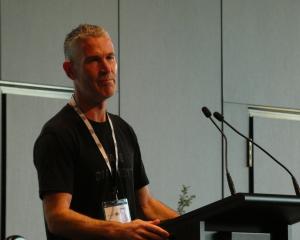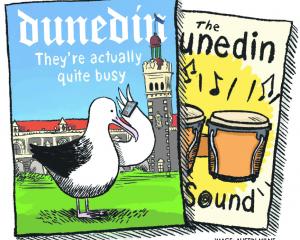
Melissa Clark-Reynolds sums herself up succinctly — "I’m a geek", she says simply.
The high-profile technology entrepreneur and business leader was in Dunedin yesterday to speak at the red meat sector conference.
Her visit coincided with her being named Beef and Lamb New Zealand’s first independent director.
And, as Ms Clark-Reynolds (53) puts it, it is a governance role she is "pretty bloody happy about".
Her career has been an eclectic mix but — armed with a curious mind and short attention span — she liked both people and science and she had "always been at the cutting edge of new ways of doing things".
"I like to think. Basically, as a director I’m paid to think and I really like it," she said.
When she headed off to Massey University as a 15-year-old — the youngest woman to attend university in New Zealand — she had thoughts of becoming a microbiologist.
She ended up doing an honours degree in anthropology and a master’s degree in health and environmental studies.
She later established a health and safety and ACC consultancy which became New Zealand’s largest private accident compensation insurer. She later sold her interest in it to Southern Cross Healthcare.
She became a professional director after 25 years’ experience as an entrepreneur and chief executive of various technology companies, including INTAZ, a health and safety company, and PayGlobal Ltd.
She now divides her time between working as a professional director and as a digital strategist, where she works with companies, particularly around the application of new technologies. Most of her work involves the future of food and agriculture in general, she says.
And despite living in downtown Wellington, she also keeps bees and produces honey for her neighbours, which she calls "urban weed honey".
On boardMs Clark-Reynolds is on the board of Radio New Zealand, architectural firm Jasmax, Kiwi Insurance and Softed.She is a member of the Ministry for Primary Industries (MPI) Primary Growth Partnership investment advisory panel, chairs the Linz risk and audit committee and also chairs a joint venture between TVNZ and New Zealand On Air around children’s television.
Ms Clark-Reynolds said she thought Beef and Lamb New Zealand had been "gutsy" getting an independent director on board, particularly one from an urban background.
Organisations prepared to bring in fresh ideas and look outside their sector had a much better chance of succeeding.
B+LNZ chairman James Parsons said the independent directorship was a newly created position designed to bring independent judgement and outside experience to the board.
The current board was composed of six farmer-elected directors, who were regionally representative, and two meat industry appointees.
Appointing Ms Clark-Reynolds was the direct result of farmers telling B+LNZ, during a governance review in 2016, they wanted a broader skill set on the board. Interest in the role was very strong with 60 applicants, Mr Parsons said.
"Melissa is well-connected and brings skills we don’t currently have on the board in the technology and start-up area, so we are looking forward to the contribution [she] will bring."
Ms Clark-Reynolds said it was a very interesting time for the sector and she was particularly attracted to B+LNZ’s strategy, which was much broader "than just being about meat" — and that was a crucial change.
Farmers were also entrepreneurs and that was one of the reasons she wanted to join the B+LNZ board.
"I like supporting people in business, particularly family businesses ... I think of farming as privately held companies.
"I think part of the mission of B+LNZ is to help those people be the best business people they possible can."
Technology changes
With her background in software, she noted what had changed the software industry would also change every industry — including red meat.
Most people thought new technologies were what changed things, but that was not the case — new business models did.
She gave the example of VR headsets, which had been in development since the late 1950s, the patent being issued in 1962.
That technology had not worked over the past 50 years because there was not a business model that would support it. It was a little like "technology looking for a home".
Likewise, 3-D printers had been around a very long time "and then suddenly it’s sexy".
She liked to quote William Gibson — "the future is already here, it’s just not very evenly distributed".
At the moment, everyone was talking about plant-based meat and milk. Every industry reacted in three ways when "something scary" came along — one of which was "point and laugh" — something she had done herself.
Several years ago, she spoke at a dairy conference and laughed about "Frankenmeat".
Last year, she ate an Impossible Foods burger — a plant-based "meat" — at Stanford University. Before that, she thought synthetic meat would be pink slime and something she would never feed to her family. Instead, she found it delicious .
Impossible Foods was not trying to sell only to vegans. It was not a rubbery vege burger — it was "real food".
The company had found a business model and it was not trying to compete with vege burgers. It was competing for meat eaters wanting a premium eating experience.
Over the past 20 years, milk consumption per capita in the United States had been in massive decline.
However, the production of plant-based milk was growing and its revenue was now greater than that of milk from mammals.
The other two responses were either trying to sue or buying them up and the biggest investors in plant-based meat in the US were the large meat companies.
So what did it all mean for New Zealand’s red meat sector?
The sector had to accept that premium customers would probably be eating less meat in the future, she said.
But what they were eating needed to taste "awesome" and be produced to high environmental and ethical standards, and that was where New Zealand’s industry needed to play.
It also needed to think about how to reduce the number of steps between the farmer and the person eating the product.
The main thing that had to be done was to stop thinking about just protein and meat and concentrate on the notion of food.













